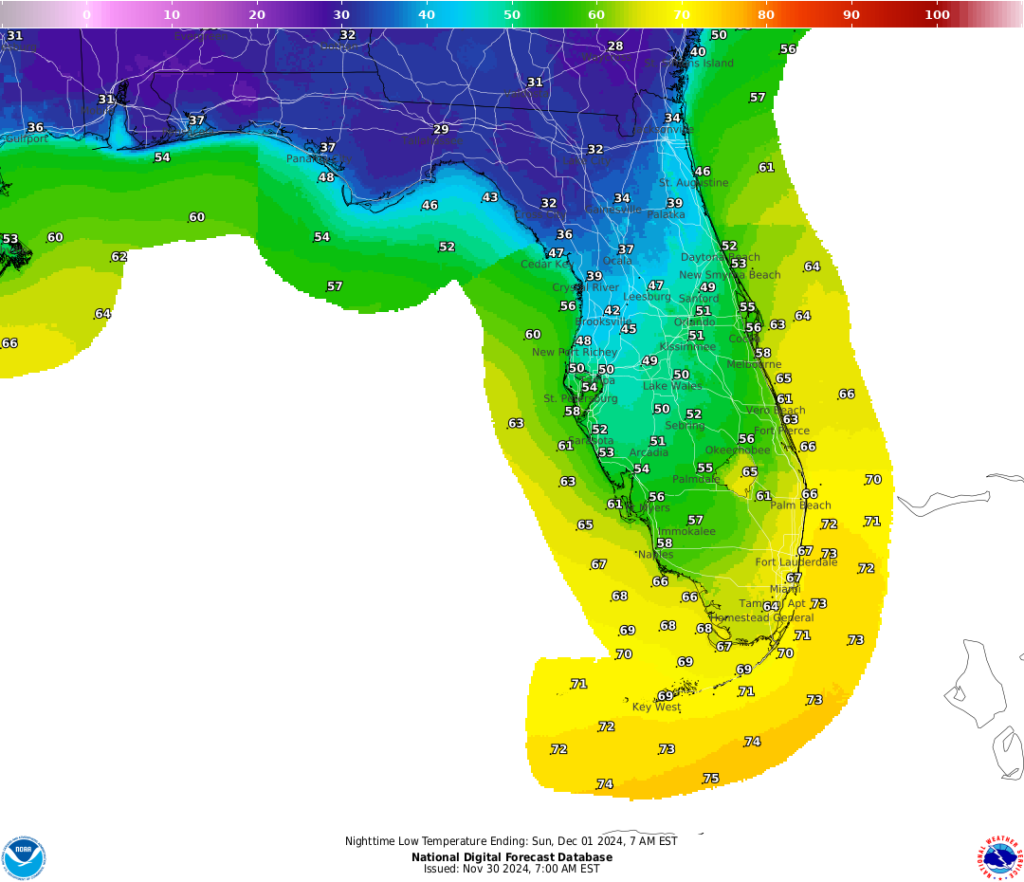As temperatures plummet across North Florida and the Suwannee Valley this weekend, freeze warnings have been issued by the National Weather Service, highlighting the potential for sub-freezing conditions. With nighttime lows expected to dip to around 28 degrees, residents are advised to take precautions, especially vulnerable populations, including young children, the elderly, and the homeless. The forecast suggests that a surface high-pressure system will settle over central Alabama, leading to calmer winds and clear skies, which will contribute to these cold temperatures. This incoming cold front, building from the Atlantic Ocean, is predicted to further reinforce the frigid air settling over the state.
In detail, the National Weather Service’s forecast indicates a differentiated impact across the region. Northeastern Florida, including Duval and St. Johns counties, is expected to see temperatures fall into the low 40s Saturday night, while Volusia County may experience slightly warmer conditions in the high 40s. In contrast, South Florida, particularly areas like Palm Beach and Brevard counties, could see minimums in the high 50s to mid-60s, with Southwest Florida expected to range between the low to mid-50s. The Tampa Bay area will face similar lows in the low 50s, but certain northern areas may see much chillier conditions, dropping to the low 30s. Meanwhile, the Big Bend and Panhandle regions are under more severe freeze watches due to the imminent temperature drops.
While the current cold snap raises questions about the possibility of snow in Florida, meteorological insights confirm that snow is unlikely. Although Florida is set to experience cold temperatures—often perceived as mild by northern standards—experts emphasize that dry conditions will accompany the cold fronts, effectively ruling out any chance of snowfall through the holiday weekend and into the start of December. The region is expected to remain clear and dry following the passage of the front, ultimately precluding the atmospheric conditions typically requisite for snow.
Historical records affirm that snow has indeed fallen in Florida, albeit infrequently. The first documented snowfall occurred in 1774, and since then, there have been over 80 months where trace amounts of snow were reported throughout the state. Significant snowfall events have been recorded, notably on January 19, 1977, when flurries reached as far south as Miami Beach, surprising residents in a state where snow is typically an anomaly. This rare weather event captured considerable media attention at the time, much akin to major national news stories, illustrating the dramatic nature of such occurrences in Florida.
As temperatures cool, attention is also drawn to the local wildlife, specifically iguanas, which could be affected by the sudden drop in temperature. The Florida Fish and Wildlife Conservation Commission notes that iguanas can enter a state of immobilization when temperatures fall between 40 and 50 degrees. Their natural instinct is to climb trees; however, cold-induced weakness can cause them to fall as they lose grip, potentially impacting their populations in areas like Collier and Lee counties. Although iguanas are primarily found along the state’s Atlantic and Gulf coasts, their vulnerability during cold snaps raises concerns for animal welfare as temperatures reach critical lows.
In summary, the approaching freeze poses significant challenges for residents across North Florida, with warnings stressing the need for protective measures for individuals, pets, and sensitive vegetation. Despite fears about snow, forecasters firmly assert that dry air will dominate throughout the cold spell. Historical accounts of snow and current wildlife impacts showcase the unique nature of Florida’s climate, where extreme weather is both rare and worthy of cautious consideration. As communities prepare for the impending chill, proactive measures—informed by weather advisories—are essential for ensuring safety and minimizing potential damage associated with frost and freezing temperatures.

